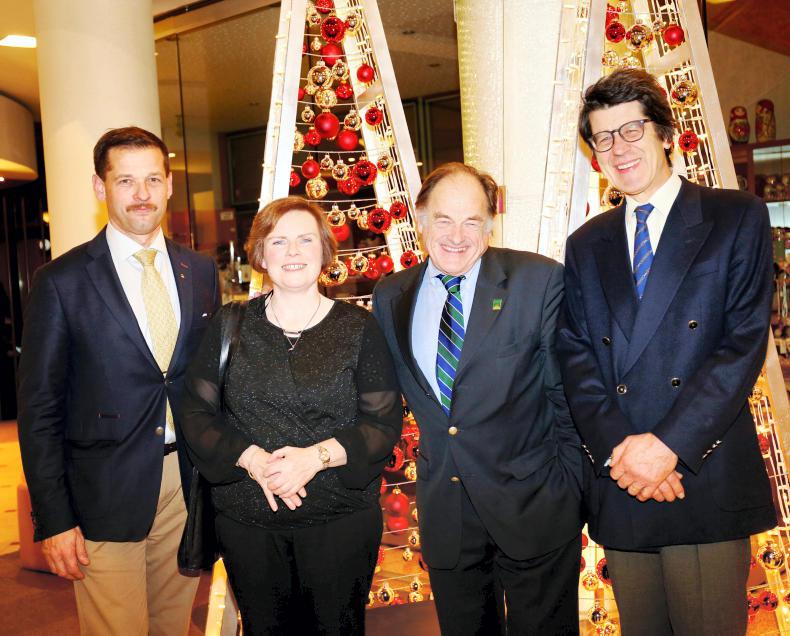THE World Breeding Federation for Sport Horses (WBFSH) General Assembly returned to Budapest after a 16-year gap and there is no doubt that the delegates in attendance from as afar afield as Canada, North America and New Zealand were left with much food for thought afterwards.
The wide-ranging topic of equine welfare was high on the agenda with British vet Roly Owers, World Horse Welfare Chief Executive, delivering a thought-provoking address on the standards expected from equestrian sport by animal rights supporters and the general public.
“This trend looks likely to gain further momentum with the millennial generation, therefore it is important for horse sport to earn and maintain its social license to operate if it is to survive into the future,” he warned.
Owers stressed that ignoring the problem is not a solution for the industry, providing the example of how greyhound racing in Australia lost its licence, largely because of perceived welfare issues and with National Hunt racing in the same country also under threat for the same reason.
“All breeders need to consider the future for their foals and not breed more than the market requires,” he said, before referring to the recent move by the British Horseracing Authority to require that all thoroughbred foals be registered within a month of birth. “And this has also happened in Ireland,” he added.
Longevity (or lack of), high attrition rates from young horse classes, the correct time to euthanise and pressure to win vast prize money at higher levels were some of the common welfare concerns gathered from the workshop.
Another concern for breeders is Warmblood Fragile Foal Syndrome. Sofia Mikko from the Swedish University of Agricultural Sciences felt that there were a number of unreported cases, particularly when a mare slipped a foal. “Don’t hide this information, be open,” she advised.
Assistant Professor Janne Winther Christensen, from Aarhus University, spoke about the impact a mare has on behavioural development in foals. She felt that calm mothers produced more stress-resilient and curious foals, which boded well for their performance careers.
MULTI-FACETED
Mark Bellissimo’s presentation was of the same thought-provoking complexity as the famous Hungarian invention; the Rubik’s Cube. This was another of his trademark multi-faceted speeches, delivered on the final day.
Citing the now defunct Kodak corporation, (which first came up with the concept of digital photography and photo sharing, yet let the opportunity slip away), as an example of how the equestrian world needs to both think and act on new ideas in the dual challenges of falling memberships and the perception that horse sports are elitist.
“We’re not thin skinned,” he said about how the Tryon team had moved on from the public criticism of the World Equestrian Games, outlining how they ‘held their hand up’ in their offer to host WEG with 15 months’ notice, against four years for other venues.
He felt that the equestrian world should not be one that only ‘heiresses’ could afford, while warning that bad horse sales, with up to six commissions being required for a horse with a €1 million price tag but realistically worth a fraction of that cost, were the number one reason that people were exiting the US horse world.
News in brief
This was the second time that Budapest has hosted the WBFSH general assembly, having first done so in 2002. “It was a pleasure to host the general assembly again. In order to give better service to the breeders, the Hungarian Sport Horse Breeders Association has done major changes in the past years, for example we’ve incorporated linear scoring. Sunday, the day dedicated to equine welfare, brought up a lot of hot topics and good ideas from both the speakers and the audience,” said the Hungarian Equestrian Federation’s International Relations representative, Dr Miklós Jármy.
The Hungarian Sport Horse Studbook (www.mslt.hu) was founded in 1994. Horse breeding was either for agricultural or military use until 1945, when it came under Soviet state control until 1989. The studbook currently has 700 broodmares and produces around 500 foals annually, while the studbook has just three employees. There are two sport horse state studs in Hungary and warmblood stallions and semen importation became more widespread too from 1994.
Berthalan de Nemethy, the revered US show jumping coach, was a cavalry officer in his native Hungary. Other well-known Hungarian exports include the late Joe Turi, who competed for Great Britain at the 1988 Seoul Olympics and John Whitaker’s distinctive grey stallion Everest Randi, by the famous Hungarian foundation sire and Shagya Arab descendant, Ramzes.
The 2019 WBFSH general assembly will be hosted in Tryon. “We believe that breeding is an important element of equestrian sport and we wanted to cover all the bases we’re dealing with in the sport. I think the breeding is the source of the horses in sport so we wanted to make sure there was a big connection,” Mark Bellissimo told The Irish Field.
The 2019 WBFSH Young Breeders championship takes place next July in Austria. Wendy Conlon, secretary of the International Young Breeders (www.young-breeders.com) gave a presentation on the association’s progress over the past year.
The WBFSH’s general assembly is also an opportunity to experience the host country’s culture and in addition to a city tour, the group also had an opportunity to visit the Lázár Equestrian Park (www.lazarlovaspark.hu) created by the Lázar brothers.
Between them, Zoltán and Vilmos have won 18 carriage driving world titles, while their children Zoltán Jnr and Zsófia have competed at European young rider and pony championship level.
Attractions at the state-of-the-art complex include a display by traditional Hungarian horsemen, featuring Nonius (the equivalent of our Irish Draught and a breed popular with European mounted police units) and Lippizaners. One brave driver drove three horses in front while standing with his feet perched on the two horses behind.
Files from the panel of speakers will be posted on the WBFSH website: www.wbfsh.org
